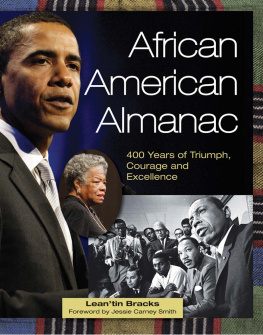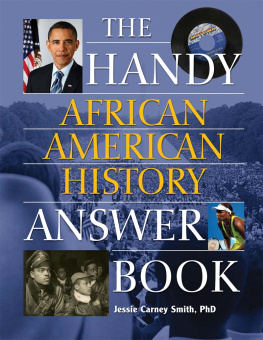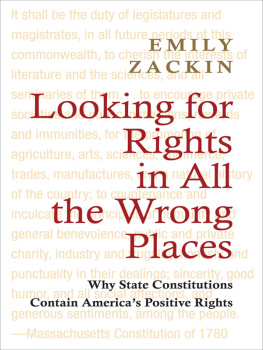About the Author

L eantin Bracks, is Associate Professor of African American Literature, Chair of the Department of Arts and Languages, and Discipline Coordinator for English at Fisk University in Nashville, Tennessee. She is the author of Writings on Black Women of the Diaspora: History Language and Identity, and editor of the university text The Black Arts Movement of the 1960s. She has made numerous contributions to historical, biographical, and critical texts such as Children of the Changing South: Accounts of Growing Up During and After Integration, Freedom
Facts and Firsts, African American National Biography, Encyclopedia of African American Popular Culture, African American Almanac 11th edition, Notable African American Men, and Contemporary African-American Novelists: A Bio-Bibliographical Critical Sourcebook. Bracks has also contributed to scholarly journals such as The Black Scholar and Nineteenth-Century Prose. Her many awards include an Honorary Degree from her undergraduate institution, Kenyon College in Gambier, Ohio; Outstanding Teaching Awards in the Humanities; and an Excellence in Service Award from her university. Dr. Bracks is a native of Texas City, Texas, and completed her graduate work at the University of Nebraska, Lincoln, where she earned her M.A. and Ph.D.
ALSO FROM VISIBLE INK PRESS
Black Firsts: 4,000 Ground-Breaking and Pioneering Events, 2nd Edition
by Jessie Carney Smith
ISBN: 978-1-57859-142-8
Black Heroes
by Jessie Carney Smith
ISBN: 978-1-57859-136-7
Freedom Facts and Firsts:
400 Years of the African American Civil Rights Experience
by Jessie Carney Smith and Linda T. Wynn
ISBN: 978-1-57859-192-3
Please visit us at VisibleInkPress.com

Copyright 2012 by Visible Ink Press
This publication is a creative work fully protected by all applicable copyright laws, as well as by misappropriation, trade secret, unfair competition, and other applicable laws.
No part of this book may be reproduced in any form without permission in writing from the publisher, except by a reviewer who wishes to quote brief passages in connection with a review written for inclusion in a magazine, newspaper, or Website.
All rights to this publication will be vigorously defended.
Visible Ink Press
43311 Joy Rd., #414
Canton, MI 48187-2075
Visible Ink Press is a registered trademark of Visible Ink Press LLC.
Most Visible Ink Press books are available at special quantity discounts when purchased in bulk by corporations, organizations, or groups. Customized printings, special imprints, messages, and excerpts can be produced to meet your needs. For more information, contact Special Markets Director, Visible Ink Press, www.visibleinkpress.com, or 734-667-3211.
Managing Editor: Kevin S. Hile
Art Director: Mary Claire Krzewinski
Typesetting: Marco Di Vita
Proofreaders: Sarah Hermsen, Sharon Malinowski
Indexing: Shoshana Hurwitz
ISBN 978-1-57859-323-1
Cover images: iStock.
Library of Congress Cataloguing-in-Publication Data
Bracks, Leantin L.
African American almanac : 400 years of triumph, courage and excellence / Leantin Bracks.
p. cm. ISBN 978-1-57859-323-1 (pbk.)
1. African AmericansHistory. 2. African AmericansSocial life and customs. 3. African AmericansIntellectual life. 4. African AmericansBiography. I. Title.
E185.B8127 2012
973.0496073dc23
2011038636
Printed in the United States of America
10 9 8 7 6 5 4 3 2 1

Contents
Foreword
A frican American history continues to be recorded in various sources and in many formats. To paraphrase on old expression, we cannot count the ways. These works tell a storyan African American storyoften arranged under a variety of main topics and subheadings. When the story is incomplete, as it often is, the reason may be that someone in Americas past failed to search for all the pieces of our puzzled lives, considered the life and work of our ancestors irrelevant, or deliberately failed to record the whole truth. As a long-time librarian in one of Americas Historically Black Colleges and Universitiesone that concentrates its sources of information on African Americans in a special collectiontime consistently proves that, thus far, we are still in need of sources. Our people continue to achieve, historians and writers continue to record, and users continue to seek accounts of our past and present.
Like any work regarding our culture that intends to be historically comprehensive, publications such as this almanac cover Americas early settlers, when Africans arrived in America, and then fill in the years between 1619 and the present. It follows that discussions of slavery will occupy a portion of this work. However it is recorded, the cruelties of the slavery period cannot be overshadowed, yet we marvel over the craftiness of our ancestors: the scientists and inventors (Elijah McCoy, Garrett A. Morgan, Onesimus, and Norbert Rillieux); the preachers (Richard Allen and Henry McNeal Turner); the abolitionists (Martin Delany, Frederick Douglass, Josiah Henson, William Still, Harriet Tubman, and Sojourner Truth); the slave insurgents (Gabriel Prosser, Nat Turner, and Denmark Vesey); the musicians (Elizabeth Taylor Greenfield, Francis Johnson, and Blind Tom); and the poets and writers (William Wells Brown, Jupiter Hammon, and Phillis Wheatley). These people and others like them left a lasting impact on our culture.
In The African American Almanac: 400 Years of Triumph, Courage and Excellence the work of these early leaders, especially the civil rights pioneers, is balanced by more contemporary American counterpartsmen like W.E.B. Du Bois, Louis Farrakhan, Marcus Garvey, Martin Luther King Jr., Malcolm X, Thurgood Marshall, Al Sharpton, and Booker T. Washington; or by women leaders such as Daisy Bates, Ella Baker, Fannie Lou Hamer, Rosa Parks, Constance Baker Motley, Mary Church Terrell, and many, many more. Similarly, the mutinies, insurrections, and the early civil rights movement are balanced by the marches, demonstrations, and protests of the twentieth century.
Like other repositories of information on African Americans and their culture, we note the continuing and increasing interest in the story of the civil rights activitiesthe work of the abolitionists, the events of the late 1800s and the modern movement of the 1960s. We see a still-surging interest in the work of women, whether in civil rights, education, politics, arts and entertainment, organizations, or elsewhere. Names like Maya Angelou, Ida Wells-Barnett, Zora Neale Hurston, Nikki Giovanni, Barbara Jordan, Toni Morrison, and Alice Walker continue to pique the interest of student researchers whose needs our libraries appropriately address. At the same time, we do not disregard the work of our leading educators, people like Mary McLeod Bethune, Nannie Helen Burroughs, Johnnetta Cole, John Hope Franklin, Benjamin Mayes, and Carter G. Woodson, or the Historically Black Colleges and Universities (HBCUs). Neither do we ignore the media for its coverage of our history, nor the achievements of those popular personalities whose names we read about almost dailyTom Joyner, Tavis Smiley, and Oprah Winfrey, for example. We shine as well in the arts, music, on stage and on screen.










